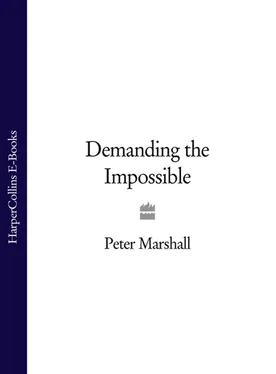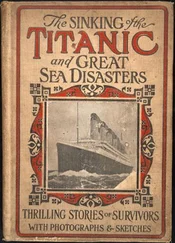Godwin based his model of a harmonious free society on the reign of reason in accordance with universal moral laws. Through education and enlightenment, people would become more rational and recognize universal truth and their common interests and act accordingly. All would listen to the voice of truth. Proudhon felt that people were necessarily dependent on each other and would gain from co-ordinating voluntarily their economic interests. Bakunin believed that conscience and reason were sufficient to govern humanity, although he was enough of a Hegelian to depict human consciousness and society developing through history in a dialectical way. Only popular spontaneous organizations could meet the growing diversity of needs and interests.
Both Kropotkin and Tolstoy based their vision of social harmony on their observations of tribal organizations and peasant villages. They were impressed by the way in which such communities arranged their lives without law and government according to custom and voluntary agreement. At the same time, Kropotkin tried to ground anarchism in the scientific study of society and natural history and to demonstrate that it was a rational philosophy which sought to live in accordance with natural and social laws. Human beings, he argued, had evolved natural instincts of sympathy and co-operation which were repressed or distorted in authoritarian and capitalist States. In the spontaneous order of a free society, they would re-emerge and be strengthened.
The State did not appear until about 5500 years ago in Egypt. While great empires like those of the Chinese and Romans ebbed and flowed, with no clear boundaries on their outer limits, most of the world’s population continued to live in clans or tribes. Their conduct was regulated by customs and taboos; they had no laws, political administration, courts, or police to maintain order and cohesion.
The State emerged with economic inequality. It was only when a society was able to produce a surplus which could be appropriated by a few that private property and class relations developed. When the rich called on the support of the shaman and the warrior, the State as an association claiming supreme authority in a given area began to emerge. Laws were made to protect private property and enforced by a special group of armed men. The State was thus founded on social conflict, not, as Locke imagined, by rational men of goodwill who made a social contract in order to set up a government to make life more certain and convenient.
Kropotkin in his study of the origins of the State argues that the Roman Empire was a State, but that the Greek cities and the medieval city republics were not. In European nations, he argues, the State barely dates from the sixteenth century when it took over the free towns and their federations. It resulted from a ‘Triple-Alliance’ of lords, lawyers and priests who dominated society. 16 They were later joined by the capitalists who continued to strengthen and centralize the State and crush free initiative. The people in the mean time were persuaded to co-operate with the process and grew accustomed to voluntary servitude.
Most anarchists would accept this version of history in general terms. While society is invariably a blessing, they accept that the State is an artificial superstructure separate from society. It is an instrument of oppression, and one of the principal causes of social evil. They therefore reject the idealist view put forward by Rousseau that the State can express the General Will of the people. They will have none of the Hegelian mysticism which tries to see the State as the expression of the spirit of a nation. They do not believe that it forms a moral being or a body politic which is somehow greater than the sum of its parts. They look through its mystifying ceremony and ritual which veil its naked power. They question its appeals to patriotism and democracy to justify the rule of the ruling minority. They do not even accept the liberal contention that the State can be considered a centre of sympathy and co-operation in certain areas.
On the other hand, anarchists have no trouble in accepting Max Weber’s definition of the State as a body which claims the monopoly of legitimate use of physical force within a given territory. It uses its monopoly of force, through the army and police, to defend itself against foreign invasion and internal dissension. As the supreme authority within a given territory, it claims the sole legitimate right to command its citizens and to be obeyed.
Anarchists also agree with socialists that the State is invariably controlled by the rich and powerful and that its legislation is inevitably made in the interests of the dominant elite. Godwin saw, like Marx, that the rich are always ‘directly or indirectly the legislators of the state’ and that government perpetuated the economic inequality in society. Kropotkin argued that the State has always been both in ancient and modern history ‘the instrument for establishing monopolies in favour of ruling minorities’. 17 With the abolition of the State, anarchists assume that greater equality will eventually be achieved but they propose widely different economic systems, ranging from laissez-faire based on private property to voluntary communism.
There is of course a difference between the State and government. Within a given territory, the State remains while governments come and go. The government is that body within the State which claims legitimate authority to make laws; it also directs and controls the State apparatus. It follows certain procedures for obtaining and using power, based in a constitution or on custom. Tucker defined the State as a ‘monopoly of government’ in a particular area, and government as an ‘invasion of the individual’s private sphere’. 18
Most anarchists however use the terms State and government loosely as if they were synonymous for the repository of political authority in society. While all anarchists are opposed to the State, a few are ready to allow government in an attenuated form in a transitional period. Godwin, at a time when Nation-States in Europe were beginning to take on their modern form, wrote mainly about the evils of government. He argued that men associated at first for the sake of mutual assistance, but the ‘errors and the perverseness of the few’ led to the need for restraint in the form of government. But while government was intended to suppress injustice, its effect had been to perpetuate it by concentrating the force of the community and aggravating the inequality of property. Once established, governments impede the dynamic creativity and spontaneity of the people:
They ‘lay their hand on the spring there is in society, and put a stop to its motion’. Their tendency is to perpetuate abuse. Whatever was once thought right and useful they undertake to entail to the latest posterity. They reverse the general propensities of man, and instead of suffering us to proceed, teach us to look backward for perfection. They prompt us to seek the public welfare, not in alteration and improvement, but in a timid reverence for the decisions of our ancestors, as if it were the nature of the human mind always to degenerate, and never to advance. 19
The individualist Stirner, on the other hand, focused on the State as the cause of evil. ‘Every State is a despotism , be the despot one or many.’ 20 Its one purpose is to limit, control and subordinate the individual.
Not all anarchists are as consistent as Godwin and Stirner. Proudhon asserted that the government of man by man is servitude, but he paradoxically defined anarchy as the absence of a ruler or a sovereign as a ‘form of government’. In a late work on federalism, he even saw a positive role for the State ‘as a prime mover and overall director’ in society. 21 Nevertheless, he acknowledged that ‘anarchical government’ is a contradiction in terms and left one of the most damning descriptions of government and bureaucracy ever made:
Читать дальше












